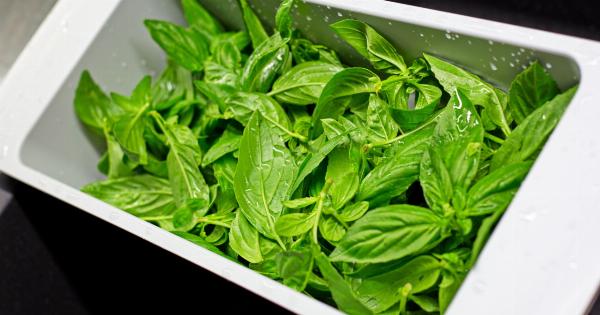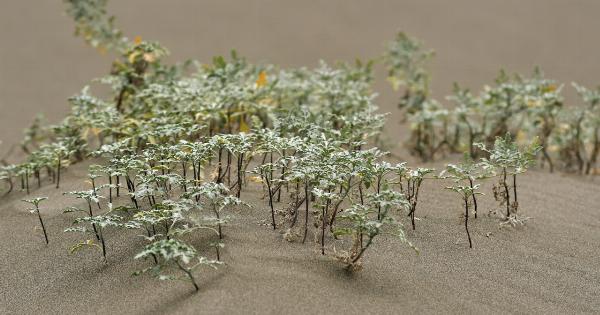AIDS is one of the deadliest diseases of our time, with more than 33 million people living with HIV worldwide. While significant progress has been made in combating the spread of the virus, there is still much work to be done.
One often-overlooked area of AIDS research is the role of oceanic resources in the fight against the disease. From seaweed-based drugs to marine biotechnology, the ocean may hold the key to discovering new treatments and ultimately finding a cure for AIDS.
Marine Biotechnology
Marine biotechnology is the study of marine organisms and their unique biochemical properties. The ocean is home to a vast array of different organisms, many of which contain compounds that have the potential to be used in the fight against AIDS.
For example, researchers have found that certain species of marine sponges produce compounds that have anti-viral properties. These compounds have been shown to be effective in fighting a number of different viruses, including HIV.
Seaweed-Based Drugs
Seaweed is a nutrient-rich marine plant that is used in a variety of different ways. From food to cosmetics, seaweed has many different applications. However, it is also gaining attention as a potential source of drugs to combat AIDS.
Researchers have discovered that certain types of seaweed contain compounds that have anti-viral properties. These compounds have been shown to be effective in preventing the replication of HIV in laboratory tests.
Oceanic Biodiversity and Drug Discovery
The ocean is home to an incredible variety of different organisms, each with its own unique set of biochemical properties. This means that the ocean is a rich source of potential drugs that could be used in the fight against AIDS.
For example, scientists have recently discovered a new species of bacteria in the ocean that produces a compound that has anti-viral properties. This compound has the potential to be developed into a new drug to combat the spread of HIV.
Marine-Based Vaccines
Vaccines are one of the most effective ways to protect against viral infections. However, developing new vaccines can be a challenging process. The ocean may hold the key to developing new, more effective vaccines to combat AIDS.
For example, researchers are studying the immune systems of certain marine organisms, such as sharks and rays, to understand how they are able to fight off viral infections. This information could be used to develop new vaccines that are more effective at preventing the spread of HIV.
Marine-Derived Antibodies
Antibodies are proteins that are produced by the immune system to help fight off infections. Marine organisms such as sharks and rays have a unique immune system that produces antibodies that are different from those found in humans.
These antibodies have the potential to be used in the development of new drugs to combat AIDS. For example, researchers are currently developing a new drug based on the antibodies found in the blood of sharks. This drug has shown promising results in laboratory tests and could ultimately be used to treat AIDS patients.
Marine Algae and Immunomodulation
Immunomodulation is the process of manipulating the immune system to better fight off infections. Researchers are studying the potential of marine algae to modulate the immune system in order to develop new treatments for AIDS.
For example, a recent study found that a molecule found in marine algae was able to stimulate the immune system to better fight off viral infections. This molecule could potentially be developed into a new drug to help AIDS patients boost their immune systems and fight off the virus.
Marine-Derived Peptides
Peptides are short chains of amino acids that play a variety of different roles in the body. Marine organisms produce a wide range of different peptides that have potential applications in the fight against AIDS.
For example, researchers have discovered a peptide produced by a marine snail that has anti-viral properties. This peptide has been shown to be effective in preventing the replication of HIV in laboratory tests.
Marine-Derived Natural Products
Natural products are compounds that are produced by living organisms. Marine organisms produce a wide range of different natural products that have potential applications in the fight against AIDS.
For example, researchers have identified a compound produced by a marine sponge that has anti-viral properties. This compound has been shown to be effective in fighting a variety of different viruses, including HIV.
Marine Bioprospecting
Bioprospecting is the process of searching for new drugs in natural sources. The ocean is a particularly rich source of potential drugs due to the incredible biodiversity found in marine environments.
Researchers are currently exploring the ocean in search of new drugs to combat AIDS. For example, a recent study identified a compound produced by a marine fungus that has anti-viral properties. This compound has the potential to be developed into a new drug to fight AIDS.
Conclusion
The ocean holds enormous potential as a source of new drugs and treatments to combat AIDS.
From marine biotechnology to seaweed-based drugs, researchers are exploring the many different ways that oceanic resources can be used to fight this deadly disease. The wide variety of marine organisms and their unique biochemical properties mean that there is still much to discover. With continued research and exploration, we may one day find a cure for AIDS in the depths of the ocean.































